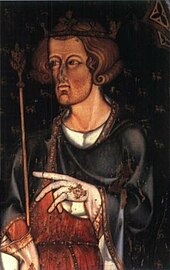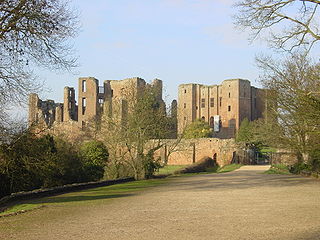
The Dictum of Kenilworth, issued on 31 October 1266, was a pronouncement designed to reconcile the rebels of the Second Barons' War with the royal government of England. After the baronial victory at the Battle of Lewes in 1264, Simon de Montfort took control of royal government, but at the Battle of Evesham the next year Montfort was killed, and King Henry III restored to power. A group of rebels held out in the stronghold of Kenilworth Castle, however, and their resistance proved difficult to crush.
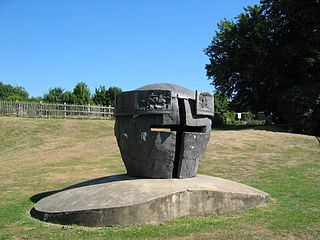
Year 1264 (MCCLXIV) was a leap year starting on Tuesday of the Julian calendar.

Henry III, also known as Henry of Winchester, was King of England, Lord of Ireland, and Duke of Aquitaine from 1216 until his death in 1272. The son of King John and Isabella of Angoulême, Henry assumed the throne when he was only nine in the middle of the First Barons' War. Cardinal Guala Bicchieri declared the war against the rebel barons to be a religious crusade and Henry's forces, led by William Marshal, defeated the rebels at the battles of Lincoln and Sandwich in 1217. Henry promised to abide by Great Charter of 1225, a later version of the 1215 Magna Carta, which limited royal power and protected the rights of the major barons. His early rule was dominated first by Hubert de Burgh and then Peter des Roches, who re-established royal authority after the war. In 1230, the King attempted to reconquer the provinces of France that had once belonged to his father, but the invasion was a debacle. A revolt led by William Marshal's son Richard broke out in 1232, ending in a peace settlement negotiated by the Church.
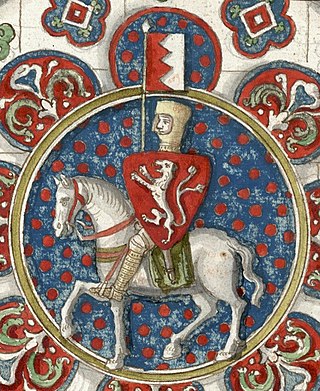
Simon de Montfort, 6th Earl of Leicester, later sometimes referred to as Simon V de Montfort to distinguish him from his namesake relatives, was an English nobleman of French origin and a member of the English peerage, who led the baronial opposition to the rule of King Henry III of England, culminating in the Second Barons' War. Following his initial victories over royal forces, he became de facto ruler of the country, and played a major role in the constitutional development of England.

The Battle of Lewes was one of two main battles of the conflict known as the Second Barons' War. It took place at Lewes in Sussex, on 14 May 1264. It marked the high point of the career of Simon de Montfort, 6th Earl of Leicester, and made him the "uncrowned King of England". Henry III's forces left the safety of Lewes Castle and St. Pancras Priory to engage the barons in battle and were initially successful, with Henry's son Prince Edward routing part of the baronial army with a cavalry charge. However, Edward pursued his quarry off the battlefield and left Henry's men exposed. Henry was forced to launch an infantry attack up Offham Hill where he was defeated by the barons' men defending the summit. The royalists fled back to the castle and priory and the King was forced to sign the Mise of Lewes, ceding many of his powers to de Montfort.
The Battle of Evesham was one of the two main battles of 13th century England's Second Barons' War. It marked the defeat of Simon de Montfort, Earl of Leicester, and the rebellious barons by the future King Edward I, who led the forces of his father, King Henry III. It took place on 4 August 1265, near the town of Evesham, Worcestershire.
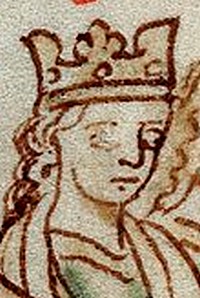
Eleanor of Provence was a Provençal noblewoman who became Queen of England as the wife of King Henry III from 1236 until his death in 1272. She served as regent of England during the absence of her spouse in France in 1253.

The Parliament of England was the legislature of the Kingdom of England from the 13th century until 1707 when it was replaced by the Parliament of Great Britain. Parliament evolved from the great council of bishops and peers that advised the English monarch. Great councils were first called Parliaments during the reign of Henry III. By this time, the king required Parliament's consent to levy taxation.
Edmund, 1st Earl of Lancaster, also known as Edmund Crouchback, was a member of the royal Plantagenet Dynasty and the founder of the first House of Lancaster. He was Earl of Leicester (1265–1296), Lancaster (1267–1296) and Derby (1269–1296) in England and Count Palatine of Champagne (1276–1284) in France.
The Provisions of Oxford were constitutional reforms to the government of late medieval England adopted during the Oxford Parliament of 1258 to resolve a dispute between Henry III of England and his barons. The reforms were designed to ensure the king adhered to the rule of law and governed according to the advice of his barons. A council of fifteen barons was chosen to advise and control the king and supervise his ministers. Parliament was to meet regularly three times a year.
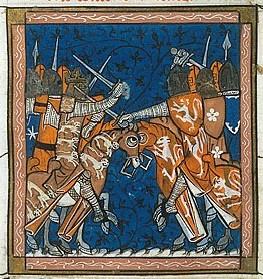
The Second Barons' War (1264–1267) was a civil war in England between the forces of barons led by Simon de Montfort against the royalist forces of King Henry III, led initially by the king himself and later by his son, the future King Edward I. The barons sought to force the king to rule with a council of barons, rather than through his favourites. The war also involved a series of massacres of Jews by de Montfort's supporters, including his sons Henry and Simon, in attacks aimed at seizing and destroying evidence of baronial debts. To bolster the initial success of his baronial regime, de Montfort sought to broaden the social foundations of parliament by extending the franchise to the commons for the first time. However, after a rule of just over a year, de Montfort was killed by forces loyal to the king at the Battle of Evesham.

The Model Parliament was the 1295 Parliament of England of King Edward I. Its composition became the model for later parliaments.
Peter de Montfort of Beaudesert Castle was an English magnate, soldier and diplomat. He is the first person recorded as having presided over Parliament as a parlour or prolocutor, an office now known as Speaker of the House of Commons. He was one of those elected by the barons to represent them during the constitutional crisis with Henry III in 1258. He was later a leading supporter of Simon de Montfort, 6th Earl of Leicester against the King. Both he and Simon de Montfort were slain at the Battle of Evesham on 4 August 1265.

The Oxford Parliament, also known as the Mad Parliament, assembled in 1258 during the reign of Henry III of England. It is best known for the Provisions of Oxford, a set of constitutional reforms that forced the English king to govern according to the advice of a council of barons.
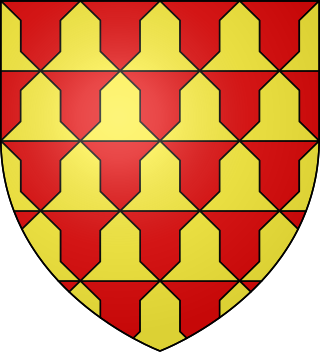
Robert de Ferrers, 6th Earl of Derby (1239–1279) was an English nobleman.
Events from the 1260s in England.
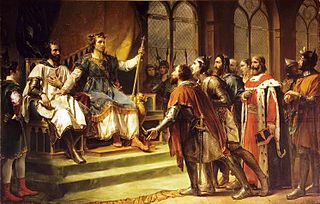
The Mise of Amiens was a settlement given by King Louis IX of France on 23 January 1264 in the conflict between King Henry III of England and his rebellious barons, led by Simon de Montfort. Louis' one-sided decision for King Henry led directly to the hostilities of the Second Barons' War.

The Mise[a]of Lewes was a settlement made on 14 May 1264 between King Henry III of England and his rebellious barons, led by Simon de Montfort. The settlement was made on the day of the Battle of Lewes, one of the two major battles of the Second Barons' War. The conflict between king and magnates was caused by dissatisfaction with the influence of foreigners at court and Henry's high level and new methods of taxation. In 1258, Henry had been forced to accept the Provisions of Oxford, which essentially left the royal government in the hands of a council of magnates, but this document went through a long series of revocations and reinstatements. In 1263, as the country was on the brink of civil war, the two parties had agreed to submit the matter to arbitration by the French king Louis IX. Louis was a firm believer in the royal prerogative, and decided clearly in favour of Henry. The outcome was unacceptable for the rebellious barons, and war between the two parties broke out almost immediately.
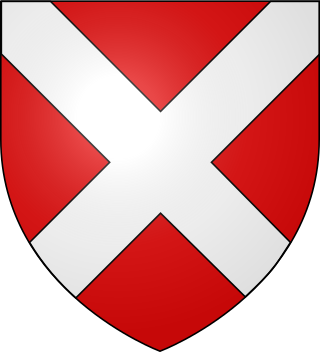
Robert de Neville, 2nd Baron Neville of Raby, was a medieval English nobleman.
The Savoyards were a faction in the royal court of Henry III of England made up of relatives and retainers of his queen Eleanor of Provence, who was the daughter of Beatrice of Savoy.




